


JACQUES LAHAUSSOIS
Food and Agriculture Organization of the United Nations
FAO intends to increase its effectiveness in the forestry sector over the next 15 years and in doing so, will contribute to improved management of trees and forests worldwide.
The scenario to aim for is an increase in the area of sustainably managed forests, a slowing of the rate of deforestation in the tropics, a decrease in forest degradation worldwide and an increase in the global area of trees and forests through afforestation and reforestation especially of degraded land. The location, extent, composition, health and value of many of the goods and services represented by forest ecosystems and trees in the landscape will be more accurately known. Informed and constructive debate between a wide range of interest groups will be increasingly used to develop consensus on forest management, particularly in defining sustainable forest management and in striking a balance between environmental and developmental objectives. Policy changes will help to remove restrictions on forestry development, will promote participatory approaches towards their management and will encourage the equitable distribution of benefits. The role of trees and forests in contributing to food security (including the wood energy required for cooking food) and environmental protection will be enhanced and better recognized. More forests will be under controlled management and periodic assessments of indicators will show a trend towards long-term sustainability. There will be a greatly increased flow of investment into the sector, particularly in developing countries and countries with economies in transition.
Before reviewing FAO's role and objectives, it is opportune to recall the FAO Forestry Department mission and its main goals.
The forestry mission of FAO is to:
"Enhance human well-being through support to member countries in the sustainable management of the world's trees and forests."
To achieve this mission, the Department has fixed itself the following three goals which would contribute to the mission:
the contribution of trees and forests to sustainable land use, food security and economic and social development and cultural values at national, regional and global levels maximized;
the conservation, sustainable management and improved utilization of trees and forest systems and their genetic resources;
the increase in worldwide access to reliable and timely forestry information.
The Forestry Department has identified eight medium-term forestry objectives in support of the three goals shown above. These objectives are the results of recommendations made during FAO meetings such as: Committee on Forestry, Regional Forestry Commissions and the Report of the Second Meeting of the High-Level Panel of External Experts on Forestry to the Director-General of FAO (January 1998).
The function of the Organization to "...collect, analyse, interpret and disseminate information relating to food, nutrition and agriculture" (Article I of the Basic Texts of FAO), remains one of the core competences of FAO. Activities in forestry sector statistics and information will continue on:
the development of common terms and the harmonization of definitions;
the collection of production, trade and capacity statistics for wood products;
forest resources assessments to provide information on natural forests and plantations, expanded through special studies to include forests available for wood supply, global forest and ecological zone maps, forest change, forest biomass, non-wood forest products, biological diversity, protected areas and forest fires;
other Departmental databases which are being or will be added on forest genetic resources (REFORGEN), forest plantations, non-wood forest products, forest products marketing, recovered paper statistics, wood energy information system and forest fires;
work will start on the methodology for assessing forest and tree resources outside the formal forest boundaries.
The FAO Forest Programme Web site, already significantly revised and expanded, will be further developed to provide even better access to external and internal users. Existing on-line databases will be expanded, and an increasing proportion of the forestry information of FAO, both textual and statistical, will be incorporated into new databases. A harmonious structure for these databases will ensure compatibility of data.
Training and institutional strengthening will continue to be an important feature of this medium-term objective.
Analyses of country- and regional-level forest and trade policy will continue, as will work on better understanding institutional issues and the fiscal requisites of sustainable forest management.
FAO will continue to coordinate action to facilitate the formulation, implementation and monitoring of national forest programmes (NFPs) including assistance in policy development and strategic planning, and in cross-sectoral and land-use planning. Special emphasis will be given to: assisting developing countries including Small Island Developing States (SIDS), and countries with economies in transition; developing policy and planning capacity, with particular reference to integrated land-use planning and the role of forestry in food security; creating an investment climate that will attract the necessary financial resources to implement NFPs.
This medium-term objective covers technical aspects of best practices for sustainable forest management and use. One of its principal components will continue to be support to the implementation of criteria and indicators for the sustainable management of forests through regional and ecoregional processes.
Measures for the conservation and management of forest genetic resources, wildlife and forest ecosystems will be reviewed in all types of forests, while studies on management systems and improved logging practices will focus largely on (a) the tropical humid zones, and (b) arid and semi-arid zones, especially low forest cover countries (LFCCs).
Support will continue to be given in the field of tree improvement, and studies will be carried out on the environmental, social and economic impacts of plantations. There will also be studies related to trees outside forests, especially the emerging issues of recreation and urban and peri-urban forestry, as well as agro-forestry and afforestation and reforestation in LFCCs.
Work on the utilization of forest products will focus on appropriate processing techniques, employment opportunities and infrastructure development, forest products marketing and the assessment of the contribution of non-wood forest products (NWFPs) to food security.
This medium-term objective covers assistance to countries in safeguarding the health and vitality of forest ecosystems and plantations from insects, diseases and other harmful biotic and abiotic agents.
Technical assistance will be provided to member countries in forest fire management and on aspects of pollution and climate change as they relate to the health of forests and trees.
The establishment of forest pest management networks will be supported and cooperation among countries will be further strengthened in the management of forest pests of regional importance.
This medium-term objective will comprise advice to member countries to assist them in analysing and designing normative and organizational structures that reflect national and international demands, and to develop the management skills needed to implement sectoral policies and programmes. Equally important is the assistance to introduce institutional changes needed on account of new technical objectives, to develop the ability to guide, monitor and evaluate utilization of public forests under the framework of new policies of privatization and liberalization, and to build the skills needed for the planning, control, management and coordination of national forest programmes. All these actions will help shape a favourable context for the successful application of the sectoral policy. The objective will further support sustainable forest management through extension and the development of methodologies for the accommodation of multiple interests, as well as forest research and education.
The Forestry Department of FAO will continue to serve as Task Manager for Agenda 21, Chapters 11 and 13, and is the lead agency for the International Year of Mountains in 20021. It will continue to give administrative support and policy and technical inputs to the international dialogue on forests, including the United Nations Forum on Forests (UNFF). FAO will continue to support the informal, high-level Inter-agency Task Force on Forests (ITFF), especially through the development of joint programmes and projects with other members. It will also continue to provide technical support to the International Convention to Combat Desertification, the Convention on Biological Diversity, and the UN Framework Convention on Global Climate Change (including the Kyoto Protocol).
The six Regional Forestry Commissions, the five Statutory Bodies and two Panels of Experts will continue to be serviced under this medium-term objective.
The medium-term objective will seek to enhance partnerships and collaboration with all actual and potential partners in the quest for sustainable forest development.
Collaboration will be sought with international and regional forestry research organizations in efforts to strengthen national research systems and reinforce links between research and development.
Links will be strengthened with the private sector in work related to industrial forest operations, processing and trade. Partnerships with NGOs which are active in sector studies, field programmes, and international policy initiatives will be further developed.
Networking and meetings (the role of FAO as a neutral forum) will facilitate consultation and collaboration between governments, the private sector, NGOs and civil society.
Relationships with regional and international development banks, development agencies, and trade groups, both for promotion of investment and exchange of information will be further strengthened.
Through the Community Forestry Programme and activities in forestry extension, FAO will work to improve the capacity of institutions involved in forestry to develop and promote participatory approaches which enable local people and other stakeholders (particularly the disadvantaged) to be involved in forest planning and management in all types of forest-related situations, and to derive adequate benefits from this involvement. Emphasis will be put on developing an enabling policy and institutional environment for effective locally-based management. Continued effort will be made to encourage equity in benefits and decision-making, especially as related to gender.
Medium-term objectives are reflected in the programme of work of the Department presented in its Programme of Work and Budget for the biennium 2002-2003. An extract of the relevant pages of the document providing further detail on the programme is attached as annex.
In addition to these objectives addressed within the Forestry Department, other priority areas will be addressed through inter-departmental mechanisms, such as:
Climate change issues in agriculture. FAO provides support to Members in connection with the UN Framework Convention on Climate Change, through the ad hoc Interdepartmental Working Group on Climate in Relation to Agriculture and Food Security, chaired by the Forestry Department.
Integrated management of biological diversity for food and agriculture. This addresses issues such as environmental conservation in forests and fragile ecosystems, and improved knowledge and best practices to promote the conservation and management of biological diversity.
Strengthening capacity for integrated ecosystem management, providing input into environmental conservation in forests and fragile ecosystems, and increased knowledge and technologies on fragile ecosystems.
In order to achieve the Organization's forestry goals, FAO will:
Continue its reliance on decentralized offices: The Organization wants to give more importance to its local offices for the execution of tasks at the national level. Efforts continue to develop these local offices while at the same time retaining the connection with headquarters thus ensuring synergies between benefits derived from local presence and from the central resources at headquarters.
Continue its efforts on normative activities: The Organization has undertaken in recent years major efforts to complement its field activities with normative functions. Such functions include review of technical information and its dissemination, organization of seminars and workshops to transfer and exchange knowledge and information, an increased role as forum for discussions, participation in international initiatives relevant to the work of the Organization. The relative importance of this type of actions has been increased and though the Organization is still active in field projects, at present normative role is its preponderant task.
Continue efficiently and effectively to execute its mandated roles: At its creation in 1945, it was envisioned that FAO would undertake its work by serving as a facilitator, or neutral forum, for policy and technical dialogue; as a source of global information; and as a provider of policy advice and technical assistance. These continue to be the Organization's primary means to carry out the forestry mission of FAO, complemented by its work in investment advice and support to research.
Set clear priorities for its work: It is proposed to maintain a broad and comprehensive programme in forestry, to address a range of technical areas related to forest development and sustainable management. This will enable the Organization to respond to the broad variety of requests from its members and will give it the flexibility to build new areas of emphasis as future needs and opportunities arise. This is consistent with the commitment of FAO to remaining both comprehensive and flexible enough to address emerging priorities. It will also ensure that FAO will (i) remain aware of the work of other organizations and (ii) be a source of expertise in a wide range of technical areas. The Forestry Department of FAO will, however, focus on certain activities which respond to calls from governing bodies or, as in the case of the UNCED follow-up process, to international demand. Such priority activities are time-limited and when they are fully or partly accomplished they will be reviewed and evaluated by the regional forestry commissions and COFO. The priority activities presently identified are grouped in priority clusters described below.
Build mutually-beneficially partnerships with other organizations: In implementing the strategic plan for forestry, FAO will proactively seek to reinforce and/or establish partnerships with other organizations carrying out related work. Collaboration and partnership are vital because no single organization has the necessary financial resources or the full range of technical skills needed to adequately address all the global forestry issues. In particular, strong partnerships will be sought among the following:
FAO member governments, national research centres, universities and other institutions;
international organizations, both those within and outside the UN system;
non-governmental environmental, development and research organizations; and
private sector, including industry and landowners.
Special attention will be given to fostering a collaborative environment within the UN system on forestry, consistent with the role of FAO as Task Manager within the UN system for the chapters of UNCED Agenda 21 on forests (Chapter 11) and on sustainable mountain development (Chapter 13), and with the sense of harmony among international organizations that has emerged through the work of the informal, ad hoc Interagency Task Force on Forests (ITFF). In particular, emphasis will be given to collaborative leadership of the ITFF in implementing the proposals for action of the Intergovernmental Panel on Forests, and for example, in support of the Intergovernmental Forum on Forests.
Extracts of FAO Programme of Work and Budget 2002-2003 related to Forestry
The rapid evolution of demands on the forestry sector presents challenges to countries to achieve sustainable management and conservation of forest resources, while ensuring that the social and economic needs of society are met. Most constraints and opportunities for forests and forestry are cross-sectoral and inter-disciplinary in nature. In particular, there are critical links between forestry and food security. Forests provide a direct source of income for hundreds of millions of people, and hence play a major role in sustaining livelihoods and reducing poverty. They are a direct source of food for millions of people in the form of non-wood forest products (NWFP) and forage for animals. Healthy forests are essential to sustainable agriculture by conserving soils and providing clean water for drinking and irrigation. The environmental services of forests, including biodiversity, are increasingly valued. In effect, areas where deforestation has been most severe, are often among the poorest.
International concern about forest loss and degradation is being translated into political commitment to sustainable forest management, and international dialogue on forests will have even greater prominence in the near future, with the establishment of the United Nations Forum on Forests (UNFF) and the supporting Collaborative Partnership on Forests (CPF) chaired by FAO. FAO will play a leading role in providing information and knowledge to support policy discussions and actions, as well as in monitoring progress made by member countries toward sustainable forest management and implementation of their commitments.
Recognizing that countries themselves hold the key to successful action, FAO will aim to strengthen national capacities to address forest sector and inter-sectoral issues through participatory processes. A National Forest Programme Facility will be established in collaboration with key partners to support these efforts.
In relation to threats to fragile ecosystems, including mountain forests, upland watersheds, deserts and mangroves, particular emphasis during the biennium will be given to FAO's lead role in the International Year of Mountains (IYM) 2002, and to ensuring effective follow-up to new initiatives which are likely to arise from this event.
The Organization will continue to provide comprehensive and timely information about all aspects of forests - environmental, social and economic. The Committee on Forestry (COFO) called upon FAO to provide leadership in knowledge management, to facilitate international dialogue on forest definitions and terminology, to expand the scope and reliability of global forest resource assessments, and to ensure that information about forests is updated on a continuous basis with heightened participation of national institutions. Forest information will be made available to Members in all official languages through use of advanced information technology, as well as traditional media.
Natural and planted forests provide an important source of climatic stability through carbon sequestration. At the same time, forests are increasingly threatened by changes in climate, fire and pest outbreaks, and other catastrophic events. FAO will play a key role in synthesizing research and disseminating timely and accurate information about forests and climate change. This work will be carried out within the context of international agreements related to climate change and in collaboration with the relevant secretariats. As requested by COFO, the Organization will also work with member countries to facilitate coordinated efforts to prevent and fight forest fires.
Critical support will be provided to the formulation and promotion of policies for sound development of forest-product industries and trade, including non-wood and wood-based forest products. Special emphasis will be given to the inter-actions between social, economic and environmental dimensions.
Objective: to support and increase national capacities to conserve, enhance and sustainably utilize natural forests and woodlands for the provision of a wide variety of goods and services.
Approach: agreement will be sought among the various regional and international processes on criteria and indicators for sustainable forest management, including key indicators for monitoring progress toward sustainable forest management at the international level and the incorporation of these indicators in national forest monitoring systems. At least two new sub-regional initiatives (Central Africa and Asia) will aim at increasing the area of forests under sustainable management through the promotion of model and demonstration forests, and the sharing of experiences and information through networking, coupled with new initiatives to address the special problems of countries with arid lands threatened by desertification. This TP will develop methodologies and best practices in silviculture and multi-purpose management of natural forests, including fragile ecosystems such as mountain forests and mangroves, and disseminate related guidelines, handbooks and case study reports. It will also cover: support to country driven regional action plans for management of forest genetic resources; secured web-based access to and enhancement of, the Global Information System on Forest Genetic Resources (REFORGEN); provision of an effective international coordination mechanism and relevant cooperative action for forest fires; and promotion of integrated pest management practices.
Objectives: to identify constraints and facilitate the uptake of improved methods of biodiversity conservation and of sustainable use of forest and wildland animal resources; to enhance the protective role and functions of trees in fragile ecosystems and marginal lands and prevent erosion and control desertification; and to increase awareness of, and action on, sustainable mountain development issues, including integrated watershed management, especially in view of the observance of the International Year of Mountains 2002.
Approach: the TP includes dissemination of technologies and technical information on critical issues in fragile ecosystems, with special reference to mountains and drylands, including capacity building in countries and networking and a guide on best practices in watershed management. Pilot watershed management activities are to generate knowledge and information on, inter alia, highland-lowland linkages. Guidelines will support effective conservation and sustainable management of biological diversity, including wildlife, in forests and wildlands, together with inventories of research needs, training and support to the UN Convention on Biological Diversity (CBD). Other activities are capacity building through training materials and workshops at regional and country level, and support and reporting to the Commission on Sustainable Development (CSD), Rio+10 and other Agenda 21 related processes, according to FAO's Agenda 21 task manager responsibilities. The TP will coordinate preparation for, and follow-up to, the International Year of Mountains 2002.
Objectives: to support national efforts in planning, management and monitoring of forest plantations and trees outside forests (including agroforestry systems, and urban and peri-urban environments), through the adoption of best practices in seed handling and supply, tree improvement, nursery, silviculture, agroforestry practices and protection intervention.
Approach: the information collection and dissemination component will include databases on forest plantations and planted trees, and provision of information on appropriate tree planting materials and tree improvement technologies (including seed exchange networks, studies and guidelines and direct advice to national institutions) as well as on management of forest plantations and planted tree resources. National efforts will benefit from the formulation of land use planning and ecosystem conservation strategies through agroforestry and other tree-based systems outside forests, and of policies and programmes for the increased integration of trees in urban and peri-urban environments.
Objectives: to systematically analyse, document and report on the status and trends in forest resources; to develop and update methods for forest inventory, analysis, assessment and monitoring based on common and agreed concepts and terms; and to strengthen national capabilities to assess forest resources and the underlying causes of deforestation and forest degradation.
Approach: global forest assessment work will continue to report on quantitative as well as qualitative information, including additional environmental, social and economic parameters. Improved Internet access to assessment results will be sought, including information on baseline data and maps on forest resources. This entity will further refine and disseminate methodologies for assessing changes in all types of forests and woodlands and support capacity building in selected countries on forest resources assessment and monitoring.
Objective: to contribute to the analysis of the environmental dimension of forests and forest practices, including their impact on climate.
Approach: a major activity is the support to the UN Framework Convention on Climate Change (FCCC), to be accompanied by workshops for capacity building on land use, land use change and forestry in relation to the Convention. Various publications are to be issued, e.g. forests' contributions to climate change mitigation, trade and marketing linkages to environmental issues, alternative systems for certification of sustainable forest management and a number of related meetings and/or seminars are to be held.
Objective: to improve availability of, and access to, information on forestry sector utilization, production, trade and marketing.
Approach: this entity will maintain the database of the global study on harvesting intensities and impact assessments. Publication outputs will include: two issues each of the Forest Products Yearbook, Non-Wood News, and the Recovered Paper Survey, four issues of Forest Energy Forum, as well as technical publications on forest harvesting and engineering intensities and related environmental impacts and unified measurements for rattan inventory, processing and trade and manual on non-wood forest products (NWFP) socio-economic assessment. An electronic network on forest energy will be supported, and updated wood energy information disseminated.
Objective: to develop and promote methodologies for best practices in forest utilization covering harvesting, engineering, processing, trade, marketing of NWFP and wood energy.
Approach: codes of forest harvesting and engineering practices will be promoted, particularly in Africa and Latin America (including publications and workshops). Four studies will be carried out on environmentally sound harvesting and engineering in selected tropical countries, as well as a review on logging impacts in moist tropical forests. Two workshops will be held on forest products marketing, and forest products trade issues and an international expert consultation will address NWFP. Technical publications will cover: marketing of selected forest products and wood energy planning, while two issues of the Forest Harvesting Bulletin are foreseen.
Objective: to facilitate long-term strategic forestry planning efforts, stimulate appropriate forestry policy reform in countries and to orient donor assistance and investment programmes to the needs of the forestry sector.
Approach: major outputs will be the State of the World's Forests (SOFO) 2003 which is also to be posted on the Internet, and the Forest Sector Outlook Study for Africa (including five sub-regional reports). Work will be initiated on the Forestry Sector Outlook Studies for Latin America and the Caribbean and for Europe (completion planned in the 2004-05 biennium). In addition, the TP carries out analytical activities related to long-term projections, descriptive scenarios and the quantitative implications of the long-term future of forests in society.
Objective: to enhance institutional arrangements and legal instruments for the forestry sector at national level.
Approach: in collaboration with key partners, an important new activity is the establishment of a National Forest Programme Implementation Facility to provide effective coordination of international support to national capacities to achieve sustainable forest management. Also relevant to national capacity building are: planned analyses of institutional issues and dissemination of results to FAO Members and partners and ongoing support to regional and international cooperation and networking for enhanced capacity in forestry research, education and extension, as well as transfer of technology for sustainable forest management.
Objective: to ensure that national forestry programmes maximize the contributions of the forestry sector to socio-economic development.
Approach: this entity will carry out continuous analysis of cross-sectoral linkages, influences and inter-relations between forestry policies and other national policies. It will facilitate national processes in countries to address inter-sectoral issues, also through workshops. The CP includes studies on key forestry policy issues such as: privatization, decentralization of policy decisions, impact on forestry of globalization and integration processes, public policies affecting forest fires, and financing. Support to countries will also benefit from the formulation of updated guidelines and the regular dissemination of status information on the implementation of national forest programmes.
Objective: to help countries define forest policies and implementation procedures that are fiscally and economically sustainable, thereby supporting long-term strategic forestry planning efforts and appropriate forestry policy reform.
Approach: this CP will analyse further the analysis of fiscal measures and tenure arrangements that serve sustainable forest management, including cross-country comparison. It will issue technical guidelines on best practice in forest products pricing, forest tax regimes and incentives for forestry, and on how to incorporate forest externalities into forestry policies and national forest programmes, and generate investment in sustainable forest management. Manuals and training workshops on the use of economic tools in forest management decisions are also planned during the biennium.
Objective: to support both sustainable forest management and sustainable livelihoods, especially of the most vulnerable, through an enabling environment for participatory management of trees, forests, and other natural resources and increased capacity by the different actors, especially those most dependent on forest resources.
Approach: major activities will be the assessment and design of supportive policy frameworks, processes, and institutions; and the preparation and dissemination of materials on participatory approaches and programmes (including linkage between conservation and development, and pathways for effective decentralization). This will be complemented by methodologies and guidelines for improving natural resource management and ensuring sustainable livelihoods, and effective tools for improving gender participation in forest decision-making processes.
Objective: to provide coordinated inputs and support to international processes and initiatives affecting the forestry sector.
Approach: analytical studies of key issues and other background documents will be required to support the United Nations Forum on Forests (UNFF). This work will be coupled with technical and policy-related studies in the context of the Work Plan of the Collaborative Partnership on Forests (CPF), chaired by FAO, with lead agency responsibility for agreed subject matter areas. At more local level, this TP will provide assistance to member countries in monitoring and reporting on the implementation of Intergovernmental Panel on Forests (IPF) and Intergovernmental Forum on Forests (IFF) proposals for action, which will contribute to the development of an effective international monitoring and reporting mechanism. The TP will also ensure: coordinated forestry inputs to international conventions, including those on biodiversity, desertification, and climate change; and periodic reports to the United Nations Commission on Sustainable Development (CSD) on the implementation of two chapters of Agenda 21 for which FAO is the task manager - Chapter 11 (Combating Deforestation) and Chapter 13 (Sustainable Mountain Development).
Objective: to disseminate forestry-related data, information and knowledge to a wide range of users.
Approach: two important ongoing activities are the Forestry Information System (FORIS), with Internet-based tools to facilitate distributed "ownership" and remote entry of data by countries and partner organizations; and updating of the Forestry section of FAO's Web site, including balanced use of FAO languages. This CP also covers advisory services to, and institution-building in, countries for the management of forest-related data, information and knowledge, particularly through technical backstopping of the International Union of Forestry Research Organizations (IUFRO)/European Commission project "Mobilizing scientific information on forests to promote their sustainable management in ACP countries". Eight issues of Unasylva are included, as well as other more specifically targeted information materials.
The following sessions of FAO Statutory Bodies in forestry are to be organized: Sixteenth session of the Committee on Forestry (COFO); six Regional Forestry Commissions; the Advisory Committee on Paper and Wood Products; the International Poplar Commission; Silva Mediterranea; the Working Group of the African Forestry and Wildlife Commission; and the Panel of Experts on Forest Genetic Resources.
In addition, this entity will coordinate the
implementation of forestry programmes across Headquarters and Regional and
Sub-regional Offices, support FAO staff seconded to other organizations and, in
collaboration with the Government of Canada, provide secretariat services to the
XII World Forestry Congress to be held in Québec City, 21-28 September
2003.
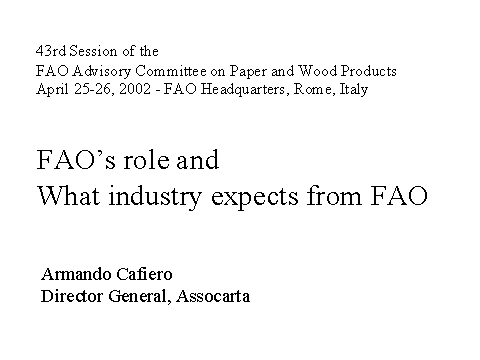
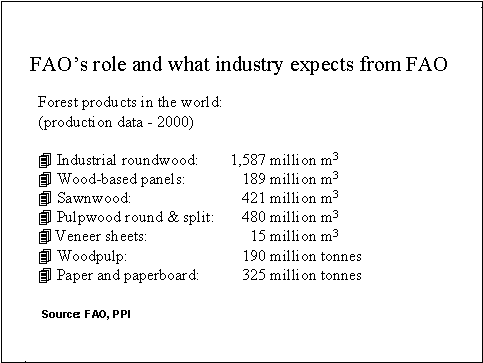
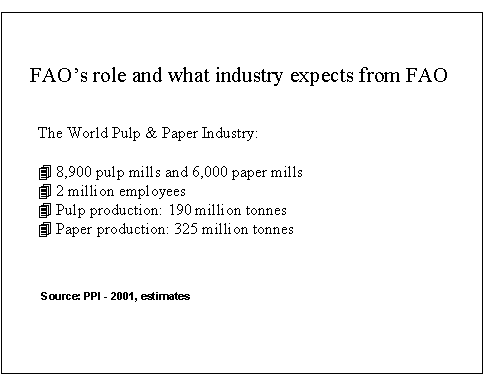
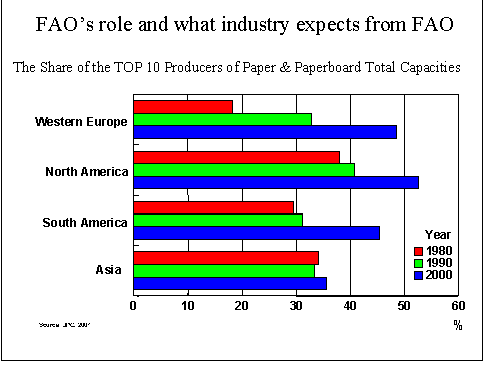
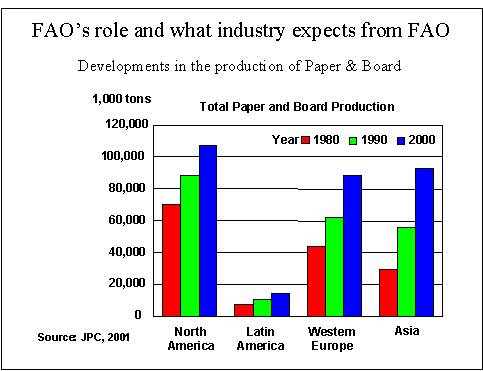
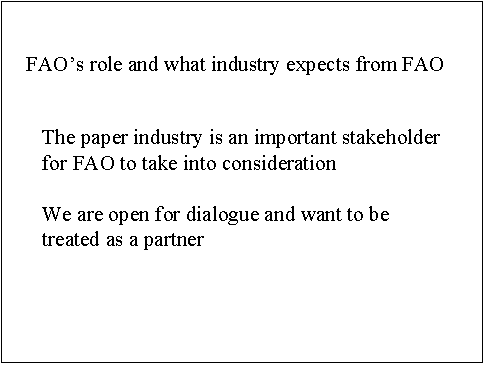
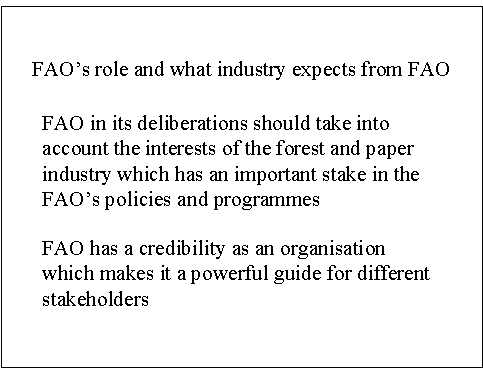
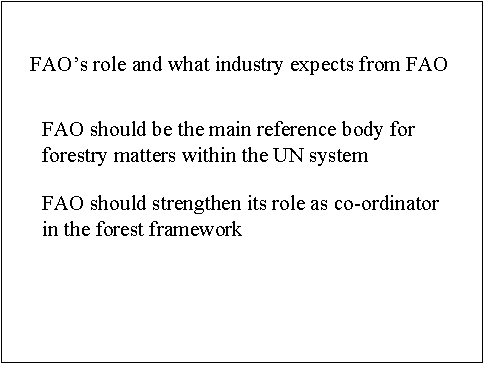
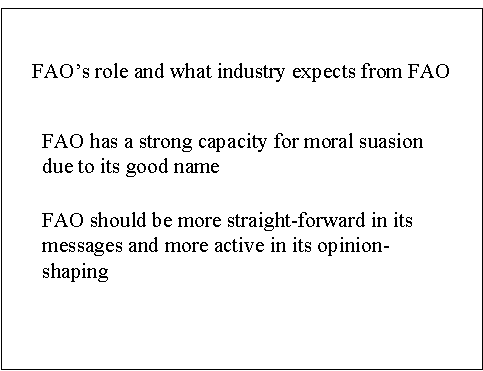
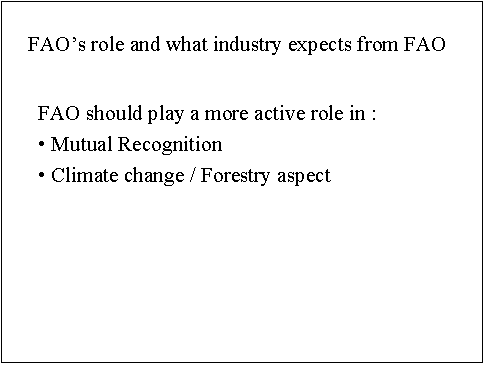
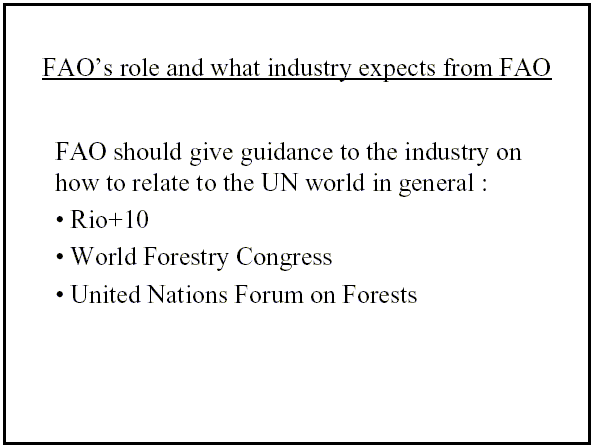
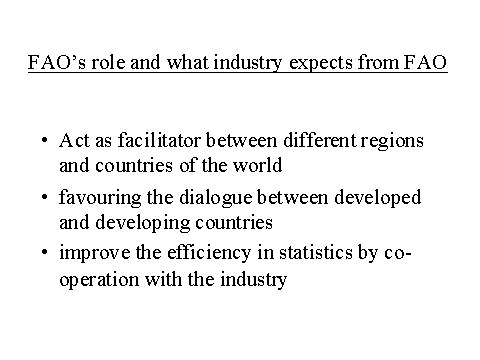
1 UN General Assembly Resolution A/53/L.24 and Report of the 115th Session of the FAO Council, paras. 103-105.